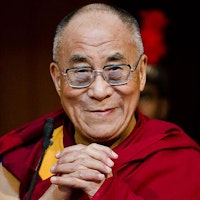The ultimate purpose of Buddhism, and for that matter all religions, is to serve and benefit man.
The ultimate purpose of Buddhism, and for that matter all religions, is to serve and benefit man.
The Dalai Lama

To Serve and Benefit
Topic: Interfaith Pathways
“Buddhism is one of the many religions which teaches us to be less selfish and more compassionate. It teaches us to be humane, altruistic and to think of others in the way we think for ourselves. Our daily thoughts and actions should be directed towards the benefit of others.
Mahayana emphasizes self-sacrifice and the development of altruism, while Theravada teaches us the importance of not harming others. The practice of Buddhism in essence is, therefore, not to harm others under any circumstances, and to help others as much as possible. By living in society we should share the sufferings of our fellow beings and practice compassion and tolerance, not only towards our loved ones but also towards our enemies. This is the test of our strength and practice, and is what is stressed in Mahayana.
Only if we can set an example by our own practice, can we hope to convince others of the value of Dharma – not by mere words. We should engage in the same high standards of integrity and sacrifice that we ask of others.
The ultimate purpose of Buddhism, and for that matter all religions, is to serve and benefit man. That is why it is of the utmost importance for us to ensure that Buddhism is always employed to realize the happiness and peace of man and not to convert others or derive benefit from them.”
Tenzin Gyatso, born on July 6, 1935, is known globally as the 14th Dalai Lama, the spiritual and former political leader of the Tibetan people. Born as Lhamo Thondup in a farming family in Taktser, Amdo, Tibet, he was recognized as the reincarnation of the 13th Dalai Lama, Thubten Gyatso, when he was just two years old. As the Dalai Lama, he holds the highest spiritual position within Tibetan Buddhism and is seen as a figure of great moral authority and influence. Following China's invasion of Tibet in 1950, he assumed full political power in 1950 but was forced into exile in India in 1959 after the failed Tibetan uprising against Chinese rule.
The Dalai Lama is renowned for his messages of peace, non-violence, inter-religious understanding, and compassion. He has authored numerous books and has lectured worldwide, becoming one of the most influential figures in the world of spirituality and philosophy. In recognition of his work for peace and non-violence, he was awarded the Nobel Peace Prize in 1989. Furthermore, his advocacy for the cultural and religious rights of the Tibetan people and his efforts to find a peaceful solution to the situation in Tibet through dialogue and understanding, rather than violence, have made him an internationally respected leader. Despite the political controversies and challenges, he remains committed to promoting human values and harmony among the world's religious traditions.
World Scripture and the Teachings of Sun Myung Moon. Universal Peace Federation, 2011, p. 385 [Tenzin Gyatso, The 14th Dalai Lama].

The Dalai Lama
Copyright © 2017 – 2026 LuminaryQuotes.com About Us

Tenzin Gyatso, The 14th Dalai Lama, World Religions for World Peace
The principles discussed so far are in accordance with the ethical teachings of all world religions. I maintain that every major religion of the world – Buddhism, Christianity, Confucianism, Hinduism, Islam, Jainism, Judaism, Sikhism, Taoism, Zoroastrianism – has similar ideals of love, the same goal of benefiting humanity through spiritual practice, and the same effect of making their followers into better human beings. All religions teach moral precepts for perfecting the functions of mind, body, and speech. All teach us not to lie or steal or take others’ lives, and so on. The common goal of all moral precepts laid down by the great teachers of humanity is unselfishness. The great teachers wanted to lead their followers away from the paths of negative deeds caused by ignorance and to introduce them to paths of goodness.
All religions agree upon the necessity to control the undisciplined mind that harbours selfishness and other roots of trouble, and each teaches a path leading to a spiritual state that is peaceful, disciplined, ethical, and wise. It is in this sense that I believe all religions have essentially the same message. Differences of dogma may be ascribed to differences of time and circumstance as well as cultural influences; indeed, there is no end to scholastic argument when we consider the purely metaphysical side of religion. However, it is much more beneficial to try to implement in daily life the shared precepts for goodness taught by all religions rather than to argue about minor differences in approach.
There are many different religions to bring comfort and happiness to humanity in much the same way as there are particular treatments for different diseases. For, all religions endeavour in their own way to help living beings avoid misery and gain happiness. And, although we can find causes for preferring certain interpretations of religious truths, there is much greater cause for unity, stemming from the human heart. Each religion works in its own way to lessen human suffering and contribute to world civilization. Conversion is not the point. For instance, I do not think of converting others to Buddhism or merely furthering the Buddhist cause. Rather, I try to think of how I as a Buddhist humanitarian can contribute to human happiness.
While pointing out the fundamental similarities between world religions, I do not advocate one particular religion at the expense of all others, nor do I seek a new ‘world religion’. All the different religions of the world are needed to enrich human experience and world civilization. Our human minds, being of different caliber and disposition, need different approaches to peace and happiness. It is just like food. Certain people find Christianity more appealing, others prefer Buddhism because there is no creator in it and everything depends upon your own actions. We can make similar arguments for other religions as well. Thus, the point is clear: humanity needs all the world’s religions to suit the ways of life, diverse spiritual needs, and inherited national traditions of individual human beings.
–The Dalai Lama. “A Human Approach to World Peace.” The 14th Dalai Lama, www.dalailama.com/messages/world-peace/a-human-approach-to-world-peace.